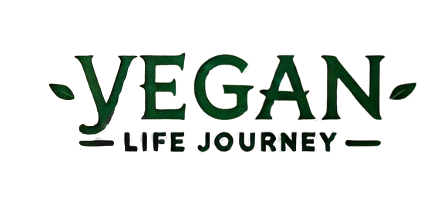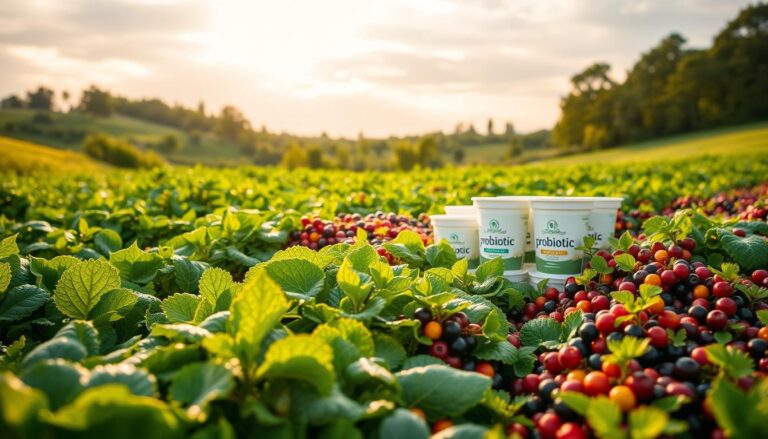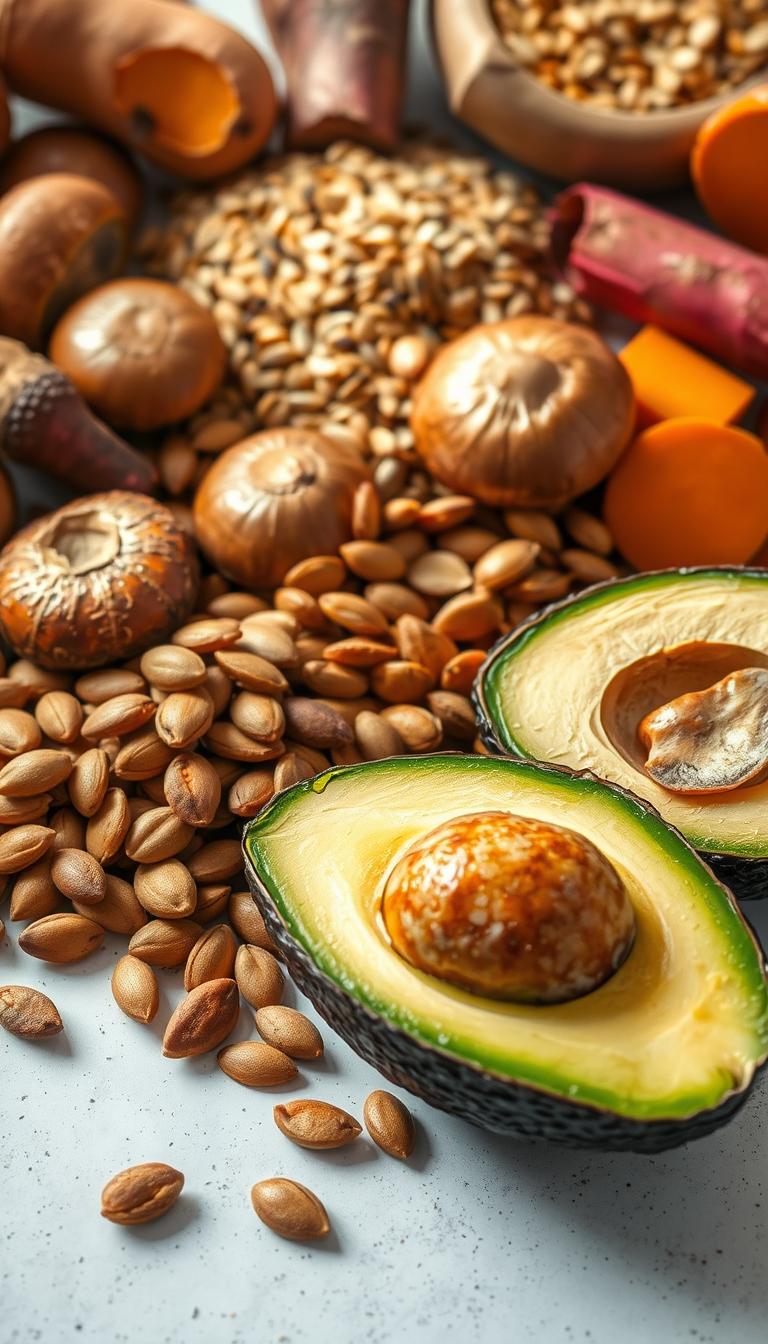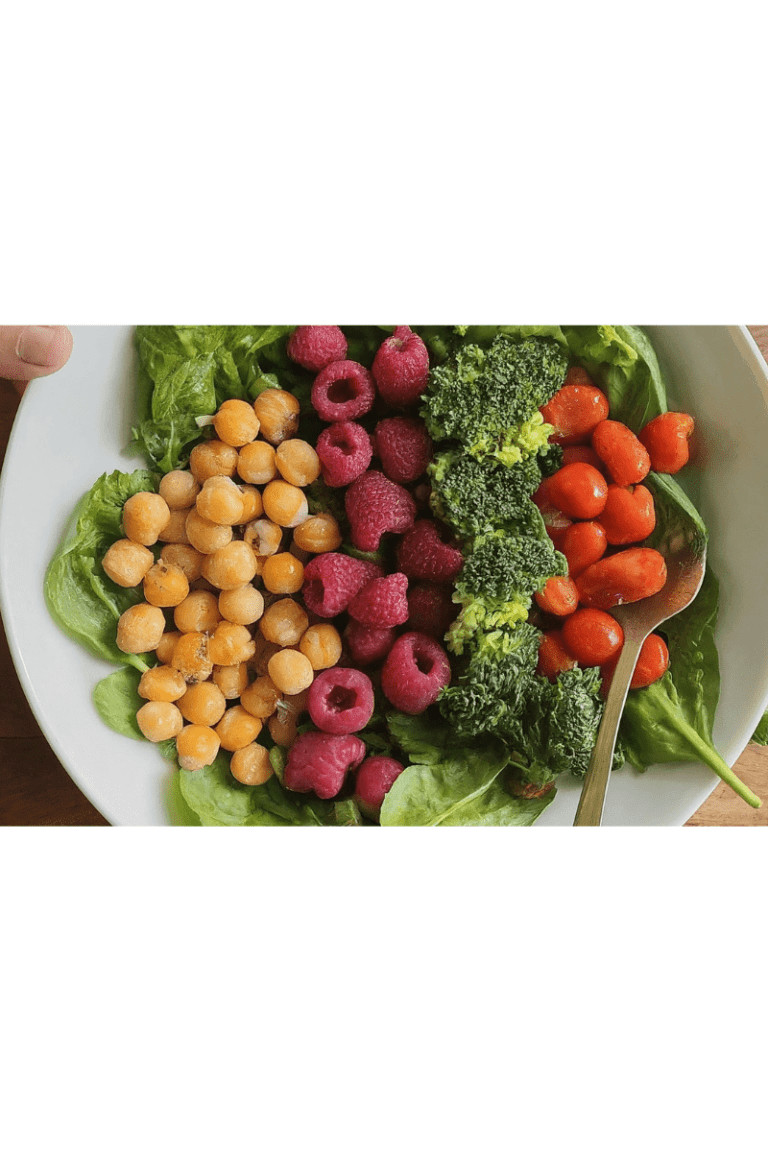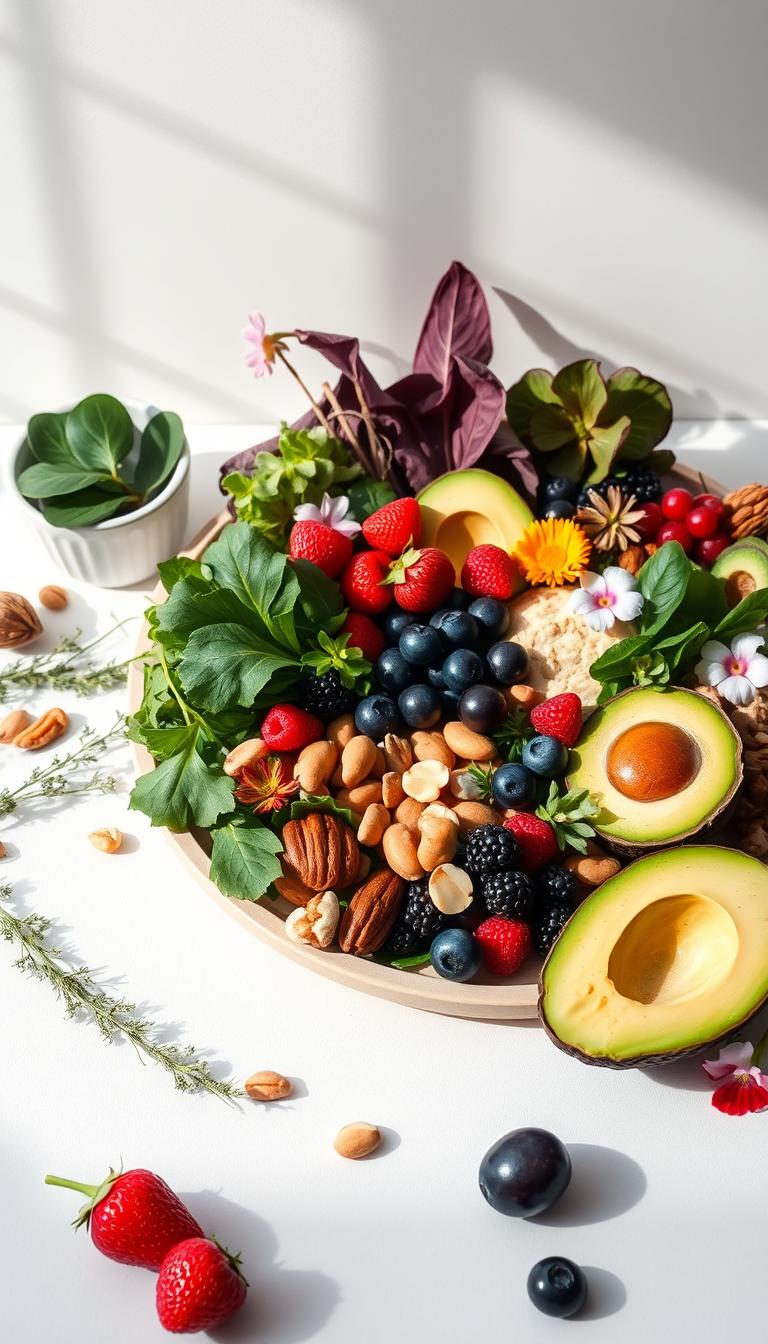
Best Collagen Rich Vegan Foods
Curious about collagen rich vegan foods?
Collagen is a key protein that keeps your skin firm and flexible. It’s the most abundant protein in our bodies, helping keep skin healthy and supporting joints. Vegans can boost collagen production through plant-based foods, not just animal sources.
Citrus fruits, berries, and leafy greens are packed with nutrients. These help your body make collagen naturally.
Plant-based foods like bell peppers, kiwis, and spinach are rich in collagen. They have vitamin C and antioxidants that protect your skin. Beans, cashews, and broccoli also provide zinc, copper, and lysine, essential for skin and joint health.
Even small changes, like eating strawberries or adding broccoli to meals, can help. Experts say eating 5–9 servings of fruits and veggies daily boosts collagen production. Remember to use sunscreen with SPF 30+ to protect your skin from UV damage.
We’ll look at vegan collagen supplements like VeCollal® and how plant-based choices keep your skin young and strong. Learn how a vegan diet supports your body’s natural collagen production without animal products.
Understanding Collagen and Why It Matters for Vegans
Collagen is the most abundant protein in your body. It plays a key role in structural protein functions. This includes strengthening connective tissues, improving skin elasticity, and supporting blood vessels. It’s vital for joint flexibility and gut health. But, how does it affect your vegan diet? Let’s explore.
What Is Collagen and Its Role in Your Body
Collagen is essential for your body. It keeps your skin elasticity high, reduces joint pain, and helps repair tissues. It’s found in bones, muscles, and blood vessels. The production of collagen relies on three essential amino acids: glycine, proline, and lysine. Without these, your body can’t rebuild connective tissues effectively.
The Vegan Collagen Challenge: Myths and Facts
Some think vegans can’t get enough collagen. But, this is a myth. Your body can make own collagen using nutrients from protein-rich foods. Foods like legumes and soy provide the necessary amino acids. While animal-based collagen isn’t vegan, plant-based diets can support natural collagen production. Vegan collagen alternatives are available, but focus on real foods first.
How Your Body Produces Its Own Collagen
Your body can build own collagen with the right foods. Here’s how to boost your production of collagen:
- Eat protein-rich foods like lentils, tofu, and quinoa for amino acids.
- Include vitamin C (bell peppers, oranges) to activate collagen enzymes.
- Limit sugar, which speeds up breakdown of collagen.
By focusing on these nutrients, you help your body repair tissues. This keeps your skin elasticity high and prevents joint stiffness.
Top Collagen Rich Vegan Foods for Your Diet
Boosting collagen doesn’t need animal products. These plant-based sources give your body the nutrients it needs. Start with the image below to visualize your meal ideas:
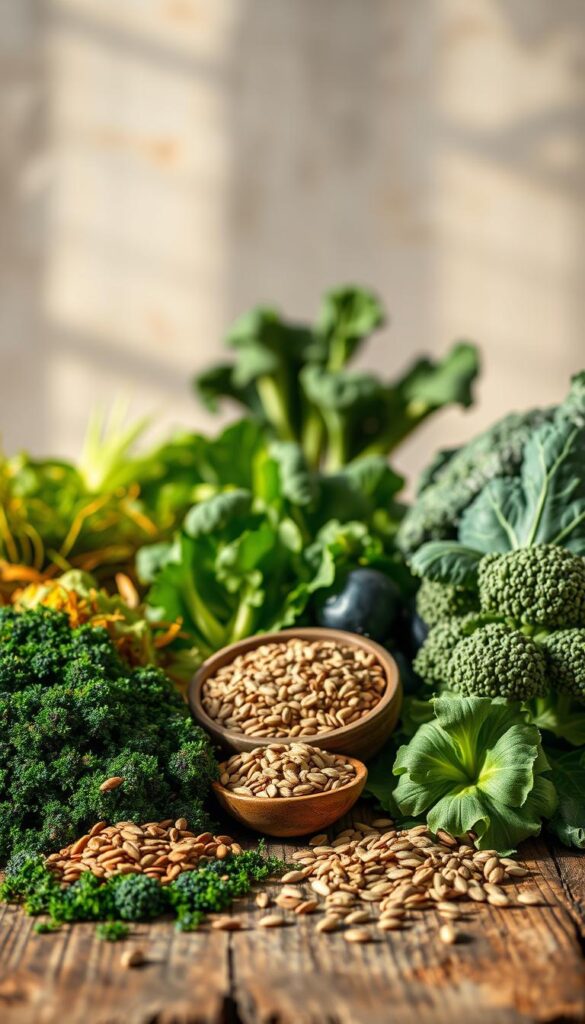
Legumes: The Protein Powerhouses
Legumes are collagen’s unsung heroes. Soy products like tofu and tempeh have genistein, which fights collagen-damaging enzymes. Swap ground beef for black beans in tacos—they’re full of zinc and proline.
Add kidney beans to soups for lysine, an amino acid vital for collagen fibers. Stir-fry with broccoli (a cruciferous vegetable) for extra vitamin C protection.
Nuts and Seeds: Essential Amino Acid Sources
Snack smart with chia seeds, sunflower seeds, and pumpkin seeds. Each spoonful of sesame seeds adds copper, aiding collagen formation. Sprinkle them on salads or blend into smoothies for a nutrient boost.
| Seed | Key Nutrient | Collagen Role |
|---|---|---|
| Chia | Omega-3s | Reduces inflammation |
| Sunflower | Zinc | Stabilizes collagen fibers |
| Pumpkin | Iron | Supports amino acid utilization |
Leafy Greens and Cruciferous Vegetables
Leafy greens like spinach and kale deliver vitamin C and antioxidants. Add cruciferous vegetables such as broccoli to your stir-fries—they supply 57% of daily vitamin C in one cup. Sauté bok choy or steam Brussels sprouts for added fiber and nutrients.
Fruits That Support Collagen Formation
Reach for citrus fruits like oranges or grapefruit for daily vitamin C. Bell peppers (yes, they’re a fruit!) offer twice the vitamin C of oranges. Tropical fruits like kiwi and mango add antioxidants. Even aloe vera juice can boost skin elasticity.
Top smoothies with sweet potatoes for beta-carotene, which converts to vitamin A—critical for skin repair.
- Add mango slices to salads for tropical flavor and collagen support.
- Blend aloe vera gel into green juices for a hydration boost.
Pair these foods with dark chocolate (copper source) and bell peppers for a collagen-boosting rainbow on your plate.
Vitamin C and Other Nutrients That Boost Collagen Production
Key nutrients play a big role in making collagen. Vitamin C is key because it helps turn pro-collagen into the fibers your body needs. You can find it in citrus fruits and red peppers.
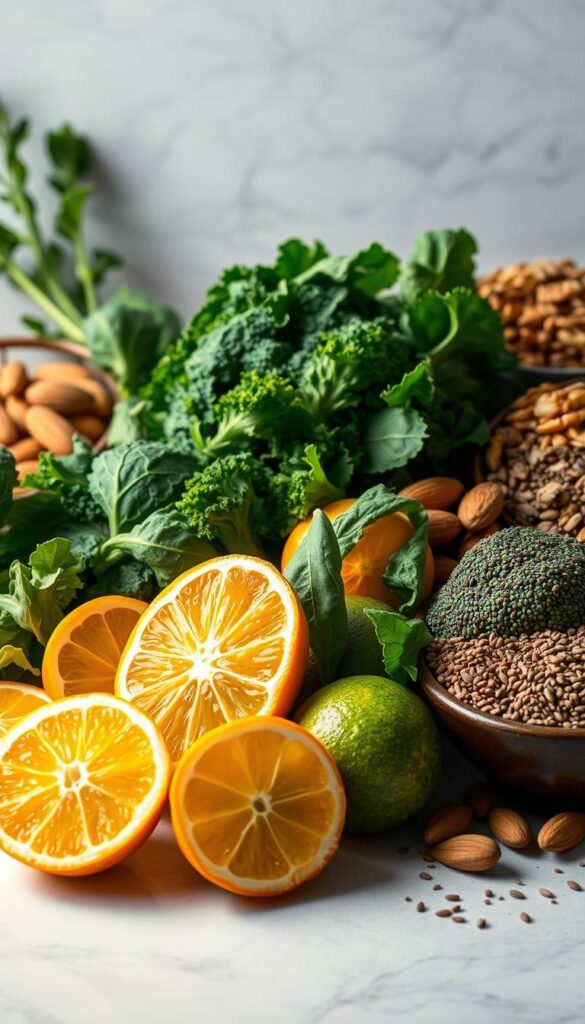
Zinc and copper are also important. They help activate proteins for collagen formation. Pumpkin seeds and chickpeas have zinc. Mushrooms and sunflower seeds have copper, which makes collagen stronger.
| Nutrient | Role | Food Sources |
|---|---|---|
| Vitamin C | Hydroxylates amino acids for collagen | Oranges, kale, strawberries |
| Zinc | Activates enzymes for synthesis | Pumpkin seeds, cashews |
| Copper | Strengthens collagen cross-linking | Mushrooms, dark chocolate |
| Vitamin E | Blocks free radical damage to collagen | Almonds, spinach |
| Sulfur (trace mineral) | Supports sulfur-rich foods like garlic | Garlic, onions |
Vitamin E has antioxidant properties that fight oxidative stress. This stress can damage collagen. Eating foods rich in these important nutrients helps a lot. Even a little bit of these nutrients can make a big difference if you eat them often.
Beyond Food: Vegan Collagen Supplements and Skincare
Supplements and skincare can boost your collagen journey, even without animal products. Learn how vegan alternatives like vegan collagen powder and plant-based formulas offer ethical, effective choices.
Vegan Collagen Supplements: Do They Work?
New innovations create vegan collagen powder using genetically modified yeast. This avoids animal-based collagen or marine collagen supplements. Look for formulas with amino acids from plant proteins like peas or quinoa.
These are natural sources of collagen precursors. Ingredients like silica from bamboo or vitamin C boost synthesis. Animal products like bone broth aren’t needed with vegan options backed by science. Always check labels: companies like Now Foods or NeoCell highlight transparency in sourcing.
Plant-Based Collagen Boosters in Skincare
Skincare can support your efforts. Creams with plant-based peptides, aloe vera, and hyaluronic acid help skin cells repair naturally. Vitamin C and E protect against uv damage.
Avoid products claiming instant results—focus on ingredients proven to strengthen collagen fibers.
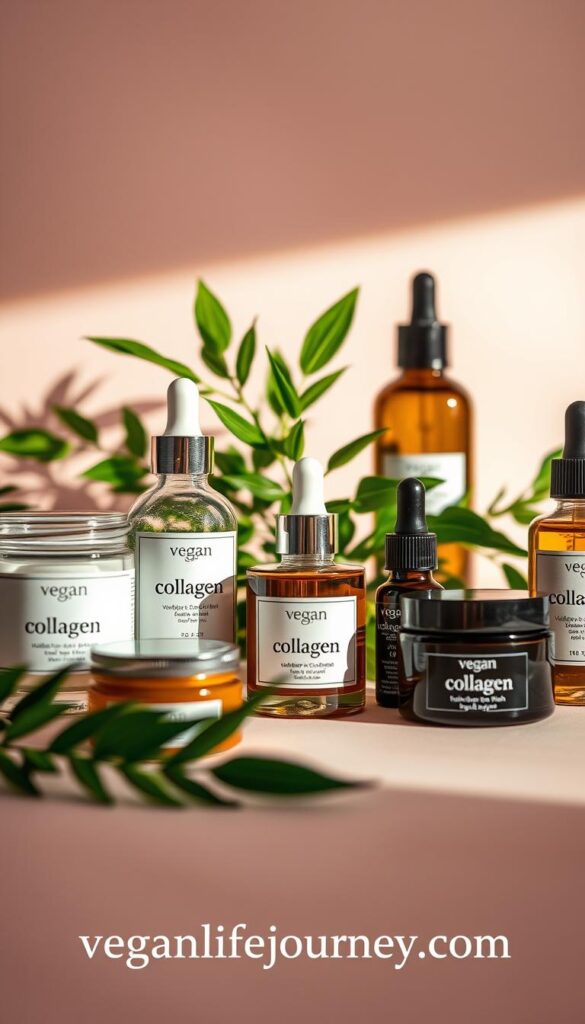
Topical antioxidants like green tea extract neutralize free radicals that weaken skin elasticity.
Protecting Your Existing Collagen
UV rays break down collagen fibers, causing fine lines. Wear broad-spectrum sunscreen daily to shield skin cells. Pair this with antioxidants in your diet—berries, dark leafy greens—to combat poor diet effects.
Even with a vegan diet, lifestyle choices like sun protection maximize your body’s collagen production. Always balance supplements with sunscreen and nutrient-rich meals.
Conclusion: Creating Your Own Collagen-Boosting Vegan Lifestyle
You don’t need animal products to build healthy collagen. A plant-based diet is full of nutrients like glycine, proline, and vitamin C. Focus on eating fresh veggies, leafy greens, and whole grains to help your body make collagen.
Legumes, nuts, and seeds are great for skin health and healing wounds. They have essential amino acids and zinc. Make sure to eat foods rich in vitamin C, like bell peppers or berries, to help your body use plant-based proteins better.
Try to eat five to nine servings of fruits and veggies every day. Stay hydrated to keep your skin and joints healthy. Use sunscreen with zinc oxide to protect your skin from UV rays.
Vegan collagen supplements, made from fermented yeast or plants, are another option. They might even work better than animal-based ones. Eating foods like chia seeds and avocado for healthy fats helps keep your skin elastic.
Small changes, like choosing whole grains or snacking on berries, can make a big difference. A plant-based lifestyle doesn’t mean you have to give up on healthy skin or joints. By eating right and being mindful, you support your body’s natural health.
Remember, a well-planned vegetarian diet is good for your hair, nails, and skin. Science backs up the idea that plant-based foods can keep you healthy. So, keep your diet colorful and varied for lasting health.
